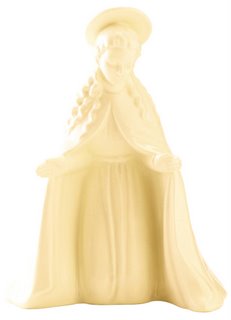Mary, Mary Quite Contrary

Well, I asked for it. I was hoping for something simple like, "Yeah we worship Mary! Gotta problem with that?"
As you alluded to in your post, there are so many small paths off this topic (or more likely leading us to it), which make it difficult for any Prod or Catholic to come to any solid agreement.
First, Protestants are not familiar with veneration as part of their religious practice, and I am sure that when a Catholic explains the difference between veneration and worship to a Protestant, a glazed look emerges over the Prod's eyes, as he/she is completely unfamiliar with the concept, and probably says to him/herself, "Sounds just like worship to me." So, as much as Catholics may try to explain dulia or hyperdulia they are (to the Protestant) categories that look a lot like worship(prayer, religious ceremony, statues, etc.) even if they are not defined as being such.
Second, adding the idea of saints to the mix confuses Protestants all the more. Since (believing in sola scriptura [that's right, I said it]) "we" define saints in a different manner than the Catholic Church. We would define it as defined by St. Paul (St. added for your sake, I just call him Paul) Throughout Paul's letters, we see reference after reference to the saints, however, the saints he mentions, fall into a very different category than that of a Catholic saint. They are not necessarily canonized, they are just followers of Jesus, they have not necessarily seen visions or performed miracles(a must for Catholic saints), they have simply associated themselves with Christ. Do not get me wrong, I believe that we should be "fans" (to quote a certain lamenting Sabers fan) of those who have lived before us and paved the way for 2 millennia, however, praying to them, is (I believe) misplaced, and I fear the "saints" would be upset by the practise. I would guess that they along with St. John the Baptist, would say, "He must increase, I must decrease."(John 3:30) All that is not Jesus is just getting in the way. Complete reliance on Christ is the point, isn't it.
In Romans 1:7, 8:27, and 15:25-26, Paul seems to see saints as those who are believers and followers of Jesus and who congregate together to serve and worship him. Furthermore, he does not make a division between these kinds of saints and those who will judge the world (see I Corinthians 6:2).
Finally, the idea of Jesus as judge seems a little misplaced to Protestants, not because Prods think of Jesus as their "buddy", but because a "courtroom" description in scripture, which tries to explain our present "legal" position with God, has its strongest argument in the letter to the Romans, where St. Paul places God as the judge and Jesus as he who stands in our defence, arguing on our behalf (see Romans 8:31-34). There is little need for anyone else to be added to the mix. The problem was between God and man, Jesus took care of the issue; that's it.
On a separate path, can you tell me when the idea of venerating Mary first came into existence?


0 Comments:
Post a Comment
<< Home